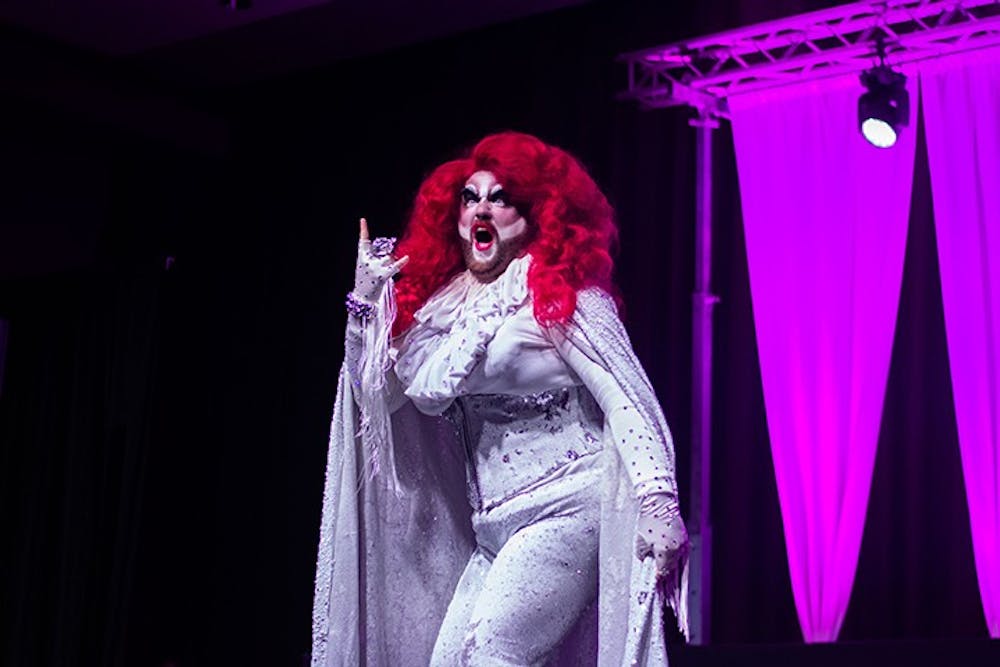Roxxxy Andrews entered the Russell House ballroom stage Wednesday night in a sheer, bedazzled dress, swaying, clapping and twerking along the way.
“Are you ready?” she lip-synced to Little Mix’s 'Bounce Back.'
It was a full house. As full as can be expected during the pandemic, anyway.
“This is some weird s— going on in here,” Andrews said following the show’s opening routine, looking out on the masked-up and socially distanced crowd before her. “What this looks like is we’re all in trouble, b—.”

Birdcage is USC’s annual drag show — a “middle finger to gender norms,” according to Caleb Coker, the offstage face behind drag queen Ebony Would. Extraordinary outfits and makeup play into what they said are the three main goals of drag: blurring gender lines, creating art and entertaining. Aside from that, there are no rules.
“The energy that people have is crazy. It’s [a] super welcoming environment,” said second-year criminology and criminal justice student Lucas Clare. “You really can feel free to do whatever you want at a drag show.”
Andrews, the night's main act, was a contestant on the popular drag competition show “RuPaul’s Drag Race” and "RuPaul's Drag Race All-Stars." Accompanying her was a lineup of five local and regional drag performers from across the state.
Hours of prep went on backstage. By Coker’s estimates, they spend 45 minutes on makeup and at least 30 on their costume, though they like to take more time when possible.
“Drag queens never look good until they hit the stage,” said Nick Raines, known onstage as the “cheese queen of South Carolina” Gouda Judy. “It is crazy. It is hectic. It's slightly unorganized, but organized in a chaotic way."
They glue their eyebrows down with the purple Elmer’s Glue stick, before moving on to makeup. (“Famously, glue sticks are bought by fourth graders and drag queens,” Coker said.) Then comes the wardrobe.
But when the final touches are made and the makeup brushes set down, the chaos gives way to confidence.
“It’s a whole fantasy,” Raines said. “That’s when Gouda comes out.”
Birdcage is hosted by Carolina Productions, the Residence Hall Association and Individuals Respecting Identities and Sexualities (IRIS).
In a typical year it welcomes more than 300 people, with students lining the hallways in anticipation of the two-hour show. This year, COVID-19 measures split the event into two one-hour sessions capped at 120, each featuring the same lineup of performers with some variance in routines.
“This is a huge event for the LGBTQ+ community on campus that they look forward to every year, and it’s been around for 30 years, so I think it’s important to keep that tradition and keep that momentum going,” Kinsey Hopkins-Campbell, third-year sport and entertainment management student and the president of Carolina Productions, said.
This year marked the seventh Birdcage for Coker, who got their start in drag by performing at frat parties that would "irritate" people back when they were a USC student. Eleven years later, Coker’s Ebony Would is a welcome sight on campus, splitting emcee duties with Andrews.
And while Would is no stranger to South Carolina’s drag scene — everybody knows her name at her shows — Birdcage is different.
“At your local gay bar at 3 in the morning, you might not see your average medical student,” Coker said. “You’re reaching a different crowd there.”
The ballroom wasn’t packed with the standard 21-and-up bar regulars, but with fresh eyes and enthusiastic students, many of whom were experiencing drag for the first time.
Fourth-year biology student Mike Ponessa was one of the many who raised his hand indicating his status as a first-timer. “RuPaul’s Drag Race” is a common sight in his apartment, but he’d never seen a drag queen beyond TV.
“As a member of the audience, I can feel the way it uplifts the performers and how empowered it makes them feel, and that just radiates out,” Ponessa said.
Drag is interpretive, or unique to each performer. While some might see it as a means of performing comedy, Coker said, others might use it to explore their gender identity. Still, others might view it entirely differently.
Veronica LeBlank began her performance in a red gown before stripping it away to the Goo Goo Dolls’ 'Iris.' “I don’t want the world to see me, ‘cause I don’t think that they’d understand,” LeBlank lip-synced as she washed away slurs from her face and body, stripped herself of drag and redressed in a black shirt and shorts. “I just want you to know who I am.”
“You really can’t make assumptions about drag,” Coker said. “When you look at someone on stage, you don’t know who that person is and what their lived experience is.”

